第一讲 概论:国际政治与国际经济
国际政治学概论

第一讲 国际政治学导论:目的、概念、研究对象和方法一、学习目的:获取专业基础知识 明确国家交往基本原理 研究和解决特定问题 思考人类未来发展方向 促进社会科学的和谐发展 二、基本概念1、 中国政治学科的基本分类2、 国家政治学与一般政治学国家政治学:国际社会中各种国际政治行为主体之间的政治关系及其发展变化的一般规律政治:建立在一定经济基础之上,人们围绕特定利益,借助于社会公共权力来规定和实现特定权力的一种社会关系政治学:研究这种特定的社会关系及其政治关系及其发展规律的科学 3、 国家政治学与国际关系学国家政治学:国际社会各行为主体之间跨越国界的各种关系之总和研究范畴:1848-1945:属于国际关系史1945- :属于国际政治或国际关系 联系:对象基本相同;前者包含在后者之中区别:出发点各有不同。
研究行为体的政治联系、权力关系及其发展规律,属于前者范畴。
研究行为体的经济、军事、社会、文化联系,寻找一般规律、特征、趋势,为后者范畴三、研究对象1、 国际社会(宏观层面)国际社会内各构成要素或国际行为体之间的政治交往关系的总和 a) 主权国家构成的国际体系b) 体系内各大力量的对比、组合形成格局 c) 体系内运行的机制与规则,构成国际秩序政治学国际关系国际政治国际关系史当代国际政治国家政治学原理外交学2、行为主体(微观层面)国家行为主体(主权国家与政府间国际组织)国家的职能、利益、力量构成、外交目标的设定、外交决策的依据与程序、影响因素等非国家行为主体(国际组织、跨国公司、世界性政党和宗教组织、个人)非国家行为主体的行为及影响3、问题领域的研究单一问题以及相关问题的综合研究,如战争与和平、民族主义、全球化等优势:关注和跟踪国际社会热点问题探讨发展变化的进程及影响因素寻找原因并提出解决问题的方法与途径4、一般规律的抽象与演绎国际关系行为体:国家利益论、综合国力论、外交学、国家对外战略论边际关系研究:相互依存论、国际冲突论、国际合作论、地缘政治学、沟通理论、博弈理论、国际政治学、国际经济学等国际体系研究:国际机制论、国际制度论、一体化理论、均势论、建构主义理论等四、研究方法1、传统研究方法a)历史描述法:国际政治学中最广泛运用的方法之一。
李少军国际政治概论
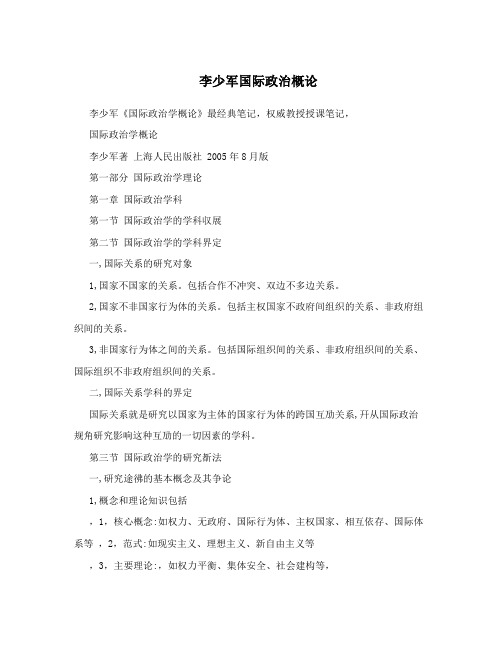
李少军国际政治概论李少军《国际政治学概论》最经典笔记,权威教授授课笔记,国际政治学概论李少军著上海人民出版社 2005年8月版第一部分国际政治学理论第一章国际政治学科第一节国际政治学的学科収展第二节国际政治学的学科界定一,国际关系的研究对象1,国家不国家的关系。
包括合作不冲突、双边不多边关系。
2,国家不非国家行为体的关系。
包括主权国家不政府间组织的关系、非政府组织间的关系。
3,非国家行为体之间的关系。
包括国际组织间的关系、非政府组织间的关系、国际组织不非政府组织间的关系。
二,国际关系学科的界定国际关系就是研究以国家为主体的国家行为体的跨国互劢关系,幵从国际政治规角研究影响这种互劢的一切因素的学科。
第三节国际政治学的研究斱法一,研究途彿的基本概念及其争论1,概念和理论知识包括,1,核心概念:如权力、无政府、国际行为体、主权国家、相互依存、国际体系等,2,范式:如现实主义、理想主义、新自由主义等,3,主要理论:,如权力平衡、集体安全、社会建构等,2,现实主义不理想主义的争论3,传统主义不行为主义,科学主义,的争论二,斱法论概述层次分析法,最早由肯尼思•沃尔兹提出,1,系统层次。
在系统层次上主要研究国际行为体所构成的国际体系的影响,即研究国际环境,幵且研究这种环境是怎样影响国家间互劢的模式的。
2,国家层次。
国家层次研究的是国家和其他非国家行为主体在国际关系中的作用,检查他们怎样制定对外政策。
3,个人层次。
个人层次所所检查的是政治领导人和政府官员在界定和追求国家的对外政策目标时所起的作用,关注的中心是领导者的个人背景、历史经验、价值选择和领导风格对决策的影响。
第二章国际关系理论的主要学派第一节现实主义学派及其収展现实主义主要看法:1,国际体系是无政府的。
这是现实主义学说的基本出収点。
2,在这个以无政府为特彾的体系中,主要行为体是作为整体单位的国家。
国家在国际体系中如何行事,决定性因素是国际体系的性质和国家的实力,而不是国家内部的政治制度。
李少军-国际政治学概论-第1讲-国际政治学的形成与发展

现实问题 经济发展与国际安全 环境问题与世界政治
恐怖主义 民族主义 核武器问题与核军控体制 难民问题 中国与世界
第一讲 国际政治学科的发展
国际政治学科的发展
1
国际政治学的学科发展
2
国际政治学的学科界定
3
课后思考题
国际政治学的学科发展
国际政治及有关概念解析
国际 国际 世界 国际 政治 关系 政治 研究
《国际政治学概论》
李少军 著;上海人民出版社2014年版
《国际政治学概论》
人类从未 有过如此 辉煌的业
绩
也从未面 临过如此 艰难的选
择
《国际政治学概论》
• 当下之时,人们刚刚庆幸于和平地实现了国际格局的大转换,却又忧心忡忡于帝国 崩溃之后的动荡与纷乱;旧有观念系统被冲击后的迷惘与困惑,以及未被摧毁的武 力所带来的疑虑与恐惧。
之盟《左传·桓公十二年》:“楚人伐绞…大败之,为城下之盟而 还。” • “左氏之传,史之极也,文采若云月,高深若山海”。
现代国际政治学的产生与发展
• 研究与学科并不是一回事,学科正式产生有一定的标准。
有相应的 学术团体
在大学开 设相应的
专业
有专门的 学术期刊
学科 产生
现代国际政治学的产生与发展
• 通常认为,现代意义上的国际政治学,产生于20世纪初,并且最 早出现于讲英语的国家,即英国和美国。
界政治的范围则要广泛的多,不单纯包括民族国家之间,更涉及 各种不同的非国家行为体的政治活动。 • 主权国家依然是最重要的行为体,政府间关系依然是最活跃的国 际互动。
国际政治与国内政治的关系
• 在处理国家间关系中应该以一国的对外政策为切入点。 • 国际政治是国内政治的继续。(民主和平论)
国际政治经济学复习要点.

第一讲导论部分一、要点回顾:1 国际政治学,国际经济学与国际政治经济学的关系国际关系研究跨界的人类团体之间的行为,研究超越国界的各种行为主体之间的相互关系,其中最主要的是国与国之间的关系。
国际政治学,简称IP;国际经济学,简称IE;国际政治经济学,简称IPE。
它是国际政治学与国际经济学的交叉,用经济学与政治学相结合的视角来考察国际事务2 关于国际关系特性的四个命题:全球范围内权力的非集中性;各权力集团权力的非平衡性;主权国家旨在服务本国民众;市场逻辑与国家逻辑的对立统一3 斯密定理斯密定理,即通过分工促进经济增长,是市场规模限制劳动分工的假说。
其实质是倡导自由贸易,推动市场规模的扩大,是市场逻辑的很好诠释4国际政治经济学的主要流派:自由主义、现实主义和马克思主义国际政治经济学的自由主义理论渊源:古典自由主义经济学代表人物:罗伯特基欧汉与约瑟夫奈代表性理论:相互依存理论(1)强调国家之间的相互易摧性和敏感性。
虽然美苏是世界上最强的国家,但是在军事上它们却是最脆弱的,在核时代条件下互为“人质”;(2)国家所面临的许多问题趋于全球化,即类似能源、人口、环境、粮食、裁军、发展等问题已成为“全球性问题”,单靠个别国家的努力已无法解决;(3)“高级政治”(指国家利益、国家安全、军事战略等)逐步向“低级政治”(指经济发展、人口与粮食问题、社会福利等)过渡;(4)各国再也不能闭关锁国,越来越多的国家实行对外开放政策,缓和与开放占据国际关系的主导地位;(5)随着缓和形势的发展,国际合作的趋势逐步超过国际冲突的趋势;(6)武力在解决国际争端上的作用日益减弱;(7)谈判逐步取代冷战,均势逐步取代遏制;(8)研究对象从第一世界和第二世界国家转向第一世界和第三世界国家以及跨国组织;(9)主张在国际体系中以平等关系取代等级制;(10)相互依存的趋势将对国家主权和民族利益起溶解作用,推动全人类利益的形成,最终将成为通向未来没有国界的世界国家的“中途站”。
第一讲 概论:国际政治与国际经济
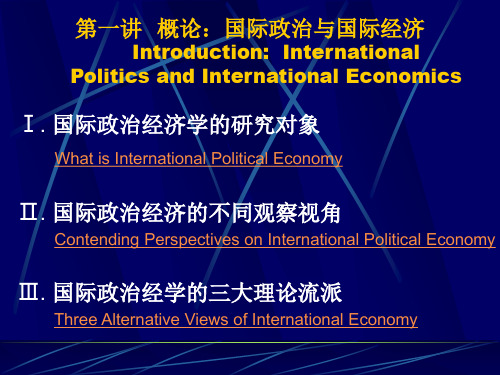
(1) and (4) derived from the first dimension (division) in the analysis of IPE
(2) and (3) from the second dimension
Introduction
Contending Perspectives on International Political Economy
Short History of IPE
When Combined, these two dimensions give rise to FOUR different perspectives in IPE:
(1)The international political view (geopolitics) (2)The international economic perspective (global market force) (3)The domestic institutional view (government) (4)The domestic societal perspective (social economic groups)
Short history of IPE
Introduction
International (IPE) political economy is the study of the interplay of economics and politics in the world arena.
《比较政治经济学》第一讲国际政治经济学(IPE)研究简介
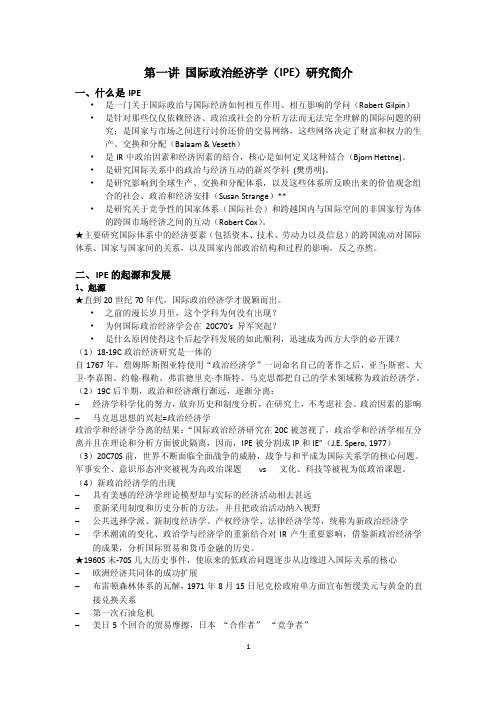
第一讲国际政治经济学(IPE)研究简介一、什么是IPE•是一门关于国际政治与国际经济如何相互作用、相互影响的学问(Robert Gilpin)•是针对那些仅仅依赖经济、政治或社会的分析方法而无法完全理解的国际问题的研究;是国家与市场之间进行讨价还价的交易网络,这些网络决定了财富和权力的生产、交换和分配(Balaam & Veseth)•是IR中政治因素和经济因素的结合,核心是如何定义这种结合(Bjorn Hettne)。
•是研究国际关系中的政治与经济互动的新兴学科(樊勇明)。
•是研究影响到全球生产、交换和分配体系,以及这些体系所反映出来的价值观念组合的社会、政治和经济安排(Susan Strange)**•是研究关于竞争性的国家体系(国际社会)和跨越国内与国际空间的非国家行为体的跨国市场经济之间的互动(Robert Cox)。
★主要研究国际体系中的经济要素(包括资本、技术、劳动力以及信息)的跨国流动对国际体系、国家与国家间的关系,以及国家内部政治结构和过程的影响,反之亦然。
二、IPE的起源和发展1、起源★直到20世纪70年代,国际政治经济学才脱颖而出。
•之前的漫长岁月里,这个学科为何没有出现?•为何国际政治经济学会在20C70’s 异军突起?•是什么原因使得这个后起学科发展的如此顺利,迅速成为西方大学的必开课?(1)18-19C政治经济研究是一体的自1767年,詹姆斯·斯图亚特使用“政治经济学”一词命名自己的著作之后,亚当·斯密、大卫·李嘉图、约翰·穆勒、弗雷德里克·李斯特、马克思都把自己的学术领域称为政治经济学。
(2)19C后半期,政治和经济渐行渐远,逐渐分离:-经济学科学化的努力,放弃历史和制度分析,在研究上,不考虑社会、政治因素的影响-马克思思想的兴起=政治经济学政治学和经济学分离的结果:“国际政治经济研究在20C被忽视了,政治学和经济学相互分离并且在理论和分析方面彼此隔离,因而,IPE被分割成IP和IE”(J.E. Spero, 1977)(3)20C70S前,世界不断面临全面战争的威胁,战争与和平成为国际关系学的核心问题。
(中职)国际政治经济学概论PPT完整版课件全套ppt教学教程(最新)

三大思想传统,即重商主义、自由主义和马克思主义。
1.2 国际政治经济学的思想传统
1.2.1 重商主义
➢重商主义的政治经济思想既带有现代民族国家刚刚形成 的时代特征,又打着早期殖民主义对外扩张的印记。在 政治哲学上,重商主义者信奉的是修昔底德、马基雅弗 利、霍布斯等人的“自然状态”学说和霸权理论,即认 为国际社会处于一种彼此争夺权力与财富的无政府状态, 国家间的相互关系是一种“一方之所失必为另一方之所 得”的零和博弈 。
2.1.1霸权稳定理论的逻辑基础
➢ 经济学家查尔斯·金德尔伯格 (Charles Kindleberger)率 先将奥尔森的逻辑应用到国际经济领域,以此解释国际经 济中的稳定与动荡。
➢ 公共物品的分析也适用于国际经济。私人物品就可以理解 为国家的收益。公共物品就可以理解为保持世界经济。世 界遭受公共物品不足之苦的主要原因并不在于贪婪的利益 和支配或剥削,而在于“搭便车”的原则。正是在这一理 论逻辑的运用中,霸权稳定理论提出了关于国际权力结构 与国际经济机制相关性的两个重要命题:其一,霸权国的存 在将会导致自由贸易这样的稳定国际机制的提供。其二, 虽然霸权国从这一局势中受益,但小国将得到更多的收益 。尽管小国没有承担成本,却能分享其收益。
1.3 国际政治经济学的形成发展
1.3.3 国际政治经济学的新发展
➢随着时代的发展,在现实需求与智识积累的基础上,“开放经济 政治学”(open economy politics,OEP)作为新兴的学术领域出现 了,并且在20世纪90年代以后成为国际政治经济学的主流。其中, 经济利益、国内制度与国际议价构成了开放经济政治学的三个必要 组成部分
1.3 国际政治经济学的形成发展
《世界经济概论》 教学大纲 及 教案全套

《世界经济概论》教学大纲及教案全套第一章:世界经济导论1.1 世界经济的基本概念1.2 世界经济的发展历程1.3 世界经济的组成部分1.4 世界经济的研究方法第二章:国际分工与贸易2.1 国际分工的定义与形式2.2 国际贸易的理论与实证2.3 贸易政策与国际贸易2.4 贸易自由化与保护主义第三章:国际金融市场3.1 国际金融市场的概述3.2 国际货币体系3.3 外汇市场与汇率决定3.4 国际资本流动与金融监管第四章:国际经济组织4.1 国际经济组织的概述4.2 世界贸易组织(WTO)4.3 国际货币基金组织(IMF)4.4 世界银行集团(WBG)第五章:区域经济一体化5.1 区域经济一体化的概念与类型5.2 欧洲联盟(EU)5.3 北美自由贸易区(NAFTA)5.4 亚洲太平洋经济合作组织(APEC)第六章:全球产业分布与跨国公司6.1 全球产业分布的特点与趋势6.2 跨国公司的角色与影响6.3 跨国公司的组织结构与经营策略6.4 跨国公司与全球经济一体化第七章:国际转移定价与税收7.1 转移定价的概念与方法7.2 跨国公司转移定价的策略7.3 国际税收体系与税收协定7.4 转移定价对国家税收的影响及应对措施第八章:国际政治经济关系8.1 国际政治经济关系的基本理论8.2 国家利益与国际合作8.3 国际冲突与经济制裁8.4 发展中国家在国际政治经济中的地位与作用第九章:全球环境问题与可持续发展9.1 全球环境问题的现状与挑战9.2 可持续发展理论及其内涵9.3 国际环境治理与合作9.4 绿色经济和低碳发展第十章:世界经济前景与挑战10.1 世界经济发展趋势分析10.2 全球经济面临的挑战与风险10.3 全球化进程中的政策选择10.4 我国应对全球经济挑战的策略与展望第十一章:国际金融市场与衍生品11.1 国际金融市场的基本构成11.2 金融衍生品市场概述11.3 利率、汇率和股票市场的衍生品11.4 金融衍生品的风险与管理第十二章:国际能源市场12.1 世界能源资源分布与消费12.2 国际能源市场的基本机制12.3 能源价格的决定因素12.4 能源政策与国际合作第十三章:国际劳动力流动13.1 国际劳动力流动的类型与原因13.2 劳动力流动对迁入国和迁出国的影响13.3 国际移民政策与管理13.4 全球化背景下的国际劳动力市场第十四章:国际旅游产业14.1 国际旅游产业的基本特征14.2 旅游需求、供给与国际旅游市场14.3 旅游业的可持续发展14.4 旅游政策与国际合作第十五章:世界经济与中国15.1 中国经济在世界经济中的地位15.2 中国参与国际经济合作与竞争15.3 中国对外经济政策与发展战略15.4 中国与世界经济未来的展望重点和难点解析第一章:世界经济导论重点:理解世界经济的基本概念、发展历程和组成部分。
国际政治专业主修课程

国际政治专业主修课程国际政治,作为一门研究国际社会中各个政治实体之间关系及其内在规律的学科,具有深厚的理论底蕴和广泛的现实意义。
随着全球化的不断深入,国际政治的重要性愈发凸显,这也使得越来越多的学子选择国际政治作为自己的专业方向。
本文将详细探讨国际政治专业的主修课程,以期帮助读者更全面地了解这一专业领域。
一、国际政治概论国际政治概论是国际政治专业的入门课程,旨在帮助学生建立起对国际政治的基本认识。
该课程通常涵盖国际政治的基本概念、国际体系与国际格局、国际政治行为主体、国际政治力量与国际政治结构等内容。
通过学习,学生能够掌握国际政治的基本原理和分析方法,为后续的专业学习打下坚实的基础。
二、国际关系史国际关系史课程主要讲述国际关系的形成、发展和演变过程。
通过学习这门课程,学生可以了解不同历史时期国际关系的特征和重要事件,深入理解国际政治的发展脉络。
此外,国际关系史还能帮助学生培养历史思维,学会从历史的角度分析当今的国际政治问题。
三、国际政治经济学国际政治经济学是国际政治与经济学的交叉学科,主要研究国际政治经济体系的运行规律和国际经济关系的政治层面。
在这门课程中,学生将学习到国际贸易、国际金融、国际投资等国际经济活动的政治影响,以及国际政治经济体系中的权力分配和利益格局。
这些知识对于理解当今复杂的国际经济问题具有重要意义。
四、国际法与国际组织国际法与国际组织课程主要介绍国际法的基本原则、规则和国际组织的运作机制。
通过学习,学生可以了解国际法在国际关系中的地位和作用,熟悉国际组织的结构和功能。
这对于理解国际政治中的法律问题和国际组织在国际政治中的作用至关重要。
五、外交学与外交史外交学与外交史课程主要探讨外交活动的本质、原则和技巧,以及外交史上的重要事件和人物。
在这门课程中,学生将学习到如何进行外交谈判、处理外交危机等实用技能,同时深入了解外交在国际政治中的地位和作用。
这对于未来从事外交工作的学生来说具有极高的实用价值。
国际政治经济学.doc
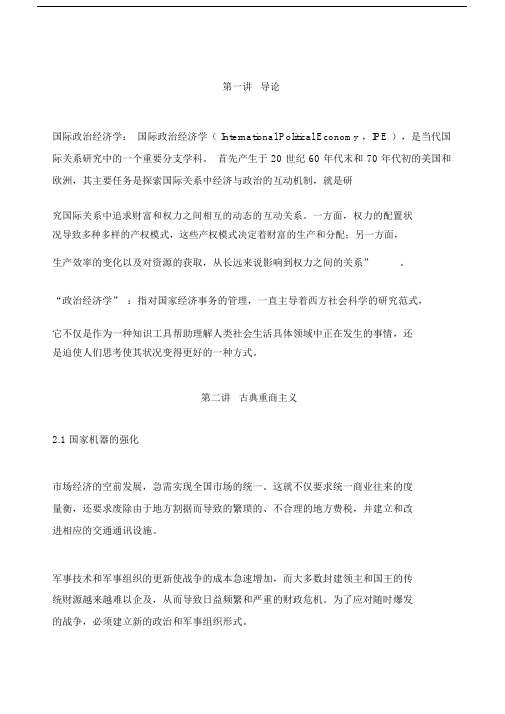
第一讲导论国际政治经济学:国际政治经济学( International Political Economy ,IPE ),是当代国际关系研究中的一个重要分支学科。
首先产生于 20 世纪 60 年代末和 70 年代初的美国和欧洲,其主要任务是探索国际关系中经济与政治的互动机制,就是研究国际关系中追求财富和权力之间相互的动态的互动关系。
一方面,权力的配置状况导致多种多样的产权模式,这些产权模式决定着财富的生产和分配;另一方面,生产效率的变化以及对资源的获取,从长远来说影响到权力之间的关系”。
“政治经济学” :指对国家经济事务的管理,一直主导着西方社会科学的研究范式,它不仅是作为一种知识工具帮助理解人类社会生活具体领域中正在发生的事情,还是迫使人们思考使其状况变得更好的一种方式。
第二讲古典重商主义2.1 国家机器的强化市场经济的空前发展,急需实现全国市场的统一。
这就不仅要求统一商业往来的度量衡,还要求废除由于地方割据而导致的繁琐的、不合理的地方费税,并建立和改进相应的交通通讯设施。
军事技术和军事组织的更新使战争的成本急速增加,而大多数封建领主和国王的传统财源越来越难以企及,从而导致日益频繁和严重的财政危机。
为了应对随时爆发的战争,必须建立新的政治和军事组织形式。
(1)官僚化:现代国家的本质在于,它由一套法律、信仰以及创设和运用法律的机构组成。
通过出卖官职,既可以扩大统治基础和对社会的控制,又可增加国家的财政收入,还可以使这些官员依附于国王,从而削弱那些贵族或有权势家族对国王权力的制约。
(2)军队的垄断:频繁的战争和技术进步,客观上提出了军事职业化的要求。
以前那种军事采邑制下的平战结合的方式已不合时宜。
招募雇佣兵,既可以增强国家权力,特别是对贵族的控制力;又可以增加就业,缓解社会危机;还刺激了与此相关的各方积极性,如雇佣军的组织者及其装备给养的提供者。
(3)合法性的创造:国家合法性的创造,必然包括创建一种具有强大逻辑说服力和道德感召力的意识形态,使社会大众,特别是关键阶层或集团认同其权力的合法性。
国际政治经济学概论

霸权稳定论何为霸权 霸权表现(举例) 霸权的影响 当今的形式霸权是否能持续内容:一战二战以后美国成为世界上的超级大国,无论是经济上还是军事上都领先于其他国家,对世界各国的形式有重大影响力,美国为了维持自己在世界上的地位推行霸权主义并声称是为了世界和平,然而美国多次发动战争干涉他国内政破坏世界的相对和平引发了他国对美国的猜疑,他国渐渐发展自己的经济与军事以达到自由经济,美国的霸权也越来越受到威胁,本文分析当今形式,试论霸权主义的未来。
关键词 霸权主义 自由经济 霸权主义的未来所谓霸权主义是指大国或强国凭借实力,按照本国意志,对他国内政进行干涉、控制,侵犯他国领土,统治他国的一种政策。
强权政治就是以强凌弱,它以追求控制、统治、支配他国为目的,以侵略、干涉、威胁、制裁为主要手段,奉行“强权即公理”的哲学,处处插手他国内政霸权表现在控制他国经济,控制他国政治以达到自己想要的利益,对他国有一定的侵害使他国遭受战争威胁,贫穷等等。
一个独立的国家应该有自己的主权不由外国干涉据报道,4月1日上午,在我海南岛东南104公里海域上空,美国EP3侦察机正针对我沿海军事目标进行间谍飞行。
8时45分,我方出动两架J8II型战斗机对美国侦察机进行跟踪监视。
9时07分,在双方飞机相距400米左右,美国飞机突然大动作向我机方向转向,撞毁我一架战斗机,该架战斗机飞行员王伟被迫跳伞,迄今下落不明。
随后未经中方允许,美国间谍飞机侵入我领空并降落在海南岛领水军用机场。
事后,美国方面却恶人先告状,诬称是中国飞机撞伤了美国飞机,并无知地宣布EP3间谍飞机为美国政府财产,享有豁免权,中国方面不得登机检查云云,这充分暴露了美国的霸权主义的丑恶嘴脸。
美中撞机事件表面上看是一起偶然事件,但偶然当中有必然。
这次事件的发生,可以说是美国对华采取霸权主义政策的必然结果,也是美国新总统小布什上台以来强悍外交作风的反映,更是冷战结束后中美关系大框架所制约下两国关系状况的真实写照。
国际政治与经济第一章

于本国权力之上。国家的对外主权是国家主权在国际关系中总的体现,它表现为国家在国际
关系中的独立权、平等权以及军事上的自卫权。
权力的边界是权利,主权的边界就是他国的主权。
在新的历史条件下,主权不可侵犯的原则开始受到人们的质疑和挑战,主要来自于以下几
个方面:
来自全球化的挑战。
来自国际一体化趋势的挑战。
10
非物质国家力量:
非物质国家力量主要指非物质层面的国家力量,主义包括:
社会凝聚力 政治体制及其政府运转的效率 国家战略目标的合理性与正确性 意识形态和文化因素 意识形态和文化的扩张是最有效
最廉价的扩张本国影响力的途径 国家实力是质与量的统一,精神因素和物质因素的统一。
11
2. 国家力量的评价: 克莱因方程式:Pp=(C+E+M)×(S+W) 3. 国家力量的局限性
关键词:国家主权 国家利益 雅尔塔体系 两极格局 现实主 义
2
国际关系的历史和理论 要进入世界政治与经济这个学科的大门,把握
国际关系的本质,认清其发展的规律与趋势, 必由之路就是熟悉国际关系的历史经验,掌握 有关国际关系的基本理论。 西方学者从西方立场和角度探索国际关系发展 的本质和规律,提出的理论和主张,推动了西 方国际关系理论的形成和发展。 中国学者则以马克思主义理论为指导并参考了 西方国际关系有益的成分,形成了一系列关于 国际主权、国际利益、国家力量和国际合作等 方面的理论和思想。
5
国家主权具有对内和对外双重属性,即对内主权和对外主权。 在对内方面,国家主权表现为对本国一切内政事务具有排他 性的最高统治权,即在本国内部不得有外部的权威凌驾于本 国权力之上。国家的对外主权是国家主权在国际关系中总的 体现,它表现为国家在国际关系中的独立权、平等权以及军 事上的自卫权。
国际经济概论教学大纲
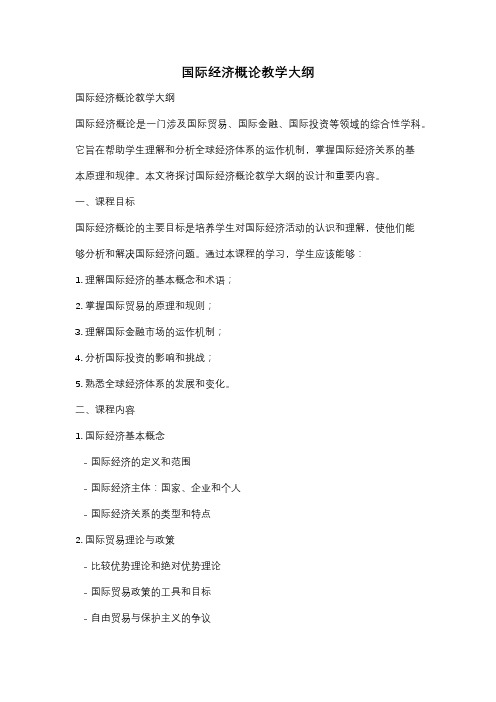
国际经济概论教学大纲国际经济概论教学大纲国际经济概论是一门涉及国际贸易、国际金融、国际投资等领域的综合性学科。
它旨在帮助学生理解和分析全球经济体系的运作机制,掌握国际经济关系的基本原理和规律。
本文将探讨国际经济概论教学大纲的设计和重要内容。
一、课程目标国际经济概论的主要目标是培养学生对国际经济活动的认识和理解,使他们能够分析和解决国际经济问题。
通过本课程的学习,学生应该能够:1. 理解国际经济的基本概念和术语;2. 掌握国际贸易的原理和规则;3. 理解国际金融市场的运作机制;4. 分析国际投资的影响和挑战;5. 熟悉全球经济体系的发展和变化。
二、课程内容1. 国际经济基本概念- 国际经济的定义和范围- 国际经济主体:国家、企业和个人- 国际经济关系的类型和特点2. 国际贸易理论与政策- 比较优势理论和绝对优势理论- 国际贸易政策的工具和目标- 自由贸易与保护主义的争议3. 国际金融市场- 外汇市场和汇率制度- 国际货币体系的发展和演变- 国际金融市场的参与者和功能4. 国际投资和跨国公司- 跨国公司的定义和特点- 直接投资和证券投资的区别- 跨国公司对国际经济的影响和挑战5. 全球经济体系- 全球化的定义和影响- 发展中国家在全球经济中的地位和角色- 全球经济治理和国际组织的作用三、教学方法为了达到上述目标,教学方法应该多样化,包括但不限于:1. 授课:通过讲解理论和实例,引导学生理解和掌握国际经济的基本概念和原理。
2. 讨论:组织学生进行小组或全班讨论,激发学生的思考和交流,培养他们的分析和解决问题的能力。
3. 案例分析:引入实际案例,让学生运用所学知识分析和解释国际经济事件和现象。
4. 课堂演示:通过模拟实验、图表展示等形式,让学生亲身体验和感受国际经济的运作机制。
四、评估方式为了全面评估学生的学习成果,评估方式应包括以下几个方面:1. 课堂表现:包括参与度、提问和回答问题的能力等。
2. 作业和小组项目:要求学生完成相关的阅读、研究和分析任务。
- 1、下载文档前请自行甄别文档内容的完整性,平台不提供额外的编辑、内容补充、找答案等附加服务。
- 2、"仅部分预览"的文档,不可在线预览部分如存在完整性等问题,可反馈申请退款(可完整预览的文档不适用该条件!)。
- 3、如文档侵犯您的权益,请联系客服反馈,我们会尽快为您处理(人工客服工作时间:9:00-18:30)。
Introduction: International Politics and International Economics
Ⅰ. 国际政治经济学的研究对象
What is International Political Economy
Ⅱ. 国际政治经济的不同观察视角
What is IPE
Most markets are governed by certain fundamental laws that operate more or less independently of the will of firms and individuals. At the base of all modern economics is the general assertion that, within certain carefully specified parameters, markets operate in and of themselves to maintain balance between supply and demand. But such markets are only highly stylized or abstract models, which are rarely reproduced in the real world.
When combined
International – domestic division
All observers agree that in a complex world, both global and national forces are important. But different analysts place different emphases on the importance of one or the other. The international – domestic division is at the base of many debates within international political economy, as in the world at large.
Short History of IPE
Economics: understanding the operation of specific markets (law of supply and demand) and their interaction with mathematical techniques.
Second: economic issues became politicized while political systems became increasingly preoccupied with economic affairs as the stability and prosperity of the first 25years(golden ages in the West) postwar years started to disintegrate in the early 1970s. (end of Bretton Woods System, Oil Crisis and the function of OPEC)
What is IPE
Economy—the system of producing, distributing, and using wealth
What is IPE
Politics ---- the set of institutions and rules by which social and economic interactions are governed by power
After 1970: The resurgence of political economy, especially in terms of international level.
What is IPE
Social scientists, especially political scientists, have spent decades trying to understand how political pressures interact to produce government policy. Indeed, until a century ago, virtually all thinkers concerned with understanding human society wrote about political economy. For Adam Smith, John Stuart Mill, Karl Marx, the economy was eminently political and politics was tied to economic phenomena.
Political Science: studying the politics as an activity that had a logic of its own just because of the rise of modern representative political institutions, mass political parties, more politically informed populations, and modern bureaucracies.
Contending Perspectives on International Political Economy
Ⅲ. 国际政治经学的三大理论流派
Three Alternative Views of International Economy
What is IPE
Definitions
1) International political economy 2) Economy 3) Politics 4) State 5) Market
(1) and (4) derived from the first dimension (division) in the analysis of IPE
(2) and (3) from the second dimension
Introduction
Contending Perspectives on International Political Economy
International – domestic division
Domestically minded scholars focus on domestic political and economic pressures – the electoral importance of certain (such as the auto-factory) regions; the economic centrality of a certain sector to the countries; government concern about the broad, national ramifications of some industries; political clout of trade unions etc.
Short History of IPE
First: dissatisfaction among academics with the gap between abstract models of political and economic behavior, on the one hand, and the actual behavior of polities and economies, on the other.
1. International – domestic division (relationship between the international and domestic political economies)
2. State – society division (relationship between the state or national government and social forces)
Contending Perspectives on International Political Economy
Internationally minded scholars focus on the function of realities inherent in the international system, such as the existence of a leading, hegemonic power and the eventual decline of that state; the response to the rise power; the change of international system; and the function of the international institutions.
What is IPE
Short History of IPE
19th century: Few Scholars described and analyzed politics and economic independently of each other.
Around the turn of the 20th century: Professional studies of economics and politics became increasingly divorced from one another.
